|
The following letter, written by Bezer—as Publisher of the Christian
Socialist—was inserted in the issue of 5 December 1851 in response to
an appeal for more readers, but the Christian Socialist was
discontinued from issue No. 61, 27 December, 1851.
________
CIRCULATION OF THE CHRISTIAN SOCIALIST.
THE CHARTIST REBEL TURNED SPY—
BUT NOT IN THE PAY OF THE GOVERNMENT.
A "free" letter, partly auto-biographical, but very much out of order.
Dear Sir,—When I read your "Appeal" in No. 53, of this Journal [1 November
1851], the first words I uttered were the chorus of one of the songs of
Mackay, I think—
"There
must be something wrong;"
and being convinced of the soundness of those first words with reference
to that "appeal," I went on a voyage of discovery, to find out what that
something was; or, in other words, I enrolled myself as a member of the
"Detectives" not so much to spy out the nakedness of the land as the cause
of it.
As I took notes on my way, more especially as I travelled
"Through Finsbury Fields, on ye road to Bethnal," will you permit the
insertion of them in your "Free Correspondence." What I said, and
what I heard—how, in going down to Jericho, I fell among thieves,—and
all about it.
The first thing I did was to have an interview with the
publisher—an intimate friend of mine, Sir, as you are aware, and who I
knew would tell me everything "without reserve," as the linen-drapers say
when they want to get rid of a slop article. "How is it, my dear
B.," said I, "that the circulation of the Christian Socialist is so
miserably low, though the recognised organ of a practical movement,
numbering its thousands of members, 'cute far-seeing souls, determined to
do what Sir Robert Peel told them to do, take their affairs into their own
hands?" "Why" says he, "there are several reasons, but two only I'll tell
you just now, and the rest another time. One is, that some of the
chaps are too 'cute, for while saving pounds annually
through joining the co-operative cause, they are afraid of spending
a penny to keep it up. And the second is, that some are not 'cute
enough, not having heard as yet even of the existence of the
periodical, as letters on my file will show." "Why, how is that?"
cried I, struck all of a heap. "Ah, that's it—it hasn't been
properly pushed;" and then, whispering in my ear, "it hasn't been
puffed." "Puffed!" I exclaimed with horror; "how can you mention
so detestable a word with reference to such an anti-puffing journal as
this?" Well, at that I did catch it, for what he chose to
call my short-sightedness, telling me—"that puffing according to truth,
was a very different thing to puffing according to lies. That if a
man sold coffee without mixing it with chicory, he had a right to say so.
That those who love truth ought—it was their holy duty—to compete
with those who love falsehood—by proclaiming it on the house-tops, and
zealously asking everybody they can get at,—Who is on the Lord's side?
That in this enlightened age; this middle of the 19th century, the
"glorious many," the "sovereign people," thought truth so valuable, that
you must just take it to them without any trouble on their parts, for the
deuce a bit would they come and fetch it, or even enquire after it, till
they had once tasted it. Then, ah then, eating will increase
their appetite, and they'll cry, give, give, as if in a galloping
consumption. That therefore, "as the supper was quite ready, one
must go into the highways and hedges, and compel them to come in," and so
he went on jabbering away, "How that he'd told a few gentlemen his views,
and they, being as sensible as himself, (as he is rather conceited), they
had cheerfully subscribed £14 for that purpose; how that he had spent £17
out of it, (he would make a good Chancellor of the Exchequer, I
must admit,—if that be a fact), in large showbills, and handsome
window-cards, and inserting advertisements in several newspapers, and
sending a "Perambulator" round the metropolis, announcing that a portrait
of "Parson Lot," (who is a very good lot, by the way), would be given with
No. 56. How that in consequence of the sale of No. 55, had nearly
doubled; that the back numbers were being sent for, wholesale, retail, and
for exportation, by parties who had never heard of it before, or who had
been told that it was dead; how that 500 extra copies had been printed of
No. 56, because he fully expected that people would, that week at any
rate, run for Christian Socialists, as in times of panics they run
for gold; how that,"—"Now, stop, stop," said I, "and do rest that tarnation tongue of your's. I had a long tongue once and got into
Newgate through it: mum, the proof of the pudding's in the eating.
Just give me a few quires of the portrait-number, and some bills and
cards, and I'll go round 'the trade' with 'em." And so I began my tour
eastward.
It has been said, Sir, that that lawyers (beg your pardon, Sir), and
printers, and newsvendors, are an unholy, inglorious trinity, having no
consciences, and willing to do anything to earn a crust. I am not versed
enough in the law to speak positively of the first class, and I shouldn't
like being indicted for a libel. Of the second class, I am afraid to
speak, inasmuch as the Co-operative Printers are all bigger men than
myself. But a number of the third class, I hesitate not to declare, have
been most maliciously belied—to wit:—In one shop I went into, the man
said, in reply to my request that he would put a bill up,—after looking
at it as if it were a Red Republican, with a pike in his hand,—"No Sir,
couldn't do it, conscience wouldn't allow me." "Conscience!" I ejaculated
in surprise, not having heard the word before in a newsvendor's shop. "Yes, Sir,
conscience—Socialist! Socialist! O dear no." "Well, but
Christian Socialist." "Ah, it's all one, all one—it's a revolutionary
thing, I know it is, and wants to upset the government. But I'm a
respectable man," puffing himself out like a bloater full roed, and
doubtless thinking at the moment of the 10th of April, and that dear,
dear, special constable's staff in the parlour. "I'm a respectable man,
and won't sell it—and that's flat."
Readers of Mister Lloyd's elevating, moralizing, instructive murder-tales,
go feast your eyes on the large blood-red pictures, those splendid
triumphs of art, portraying as they do, so accurately, how easily one man
can cut another man's throat, and then go inside, and ask for a penn'orth
of mental laudanum, and you'll not be disappointed;—but Christian
Socialists, go not near the shop, for the respectable proprietor thereof
has a conscience, and a remarkable one.
There were many as bad as he, and some still worse, for they would promise
to expose the bills, and then shove them into the waste place; (these were
the thieves I spoke of just now, while going down to Jericho)—so feeling
that hypocrites had no time redeeming quality, I went back for them;
Christian Socialist bills shall not be torn up at three half-pence per
pound, if I know it. However, I sold the lot I took out, and a goodly
number of shops have them exposed, a list of which I'll give next week. [List not published. Ed.] I mention this, because the publisher tells me,
that a great many readers of this journal go to him and buy, a very bad
arrangement. They should go anywhere but to him. If every reader will buy
at the nearest shop that agrees to put a bill up, it will be so many
standing advertisements gratis. Let every reader take this hint, and the
sale must steadily increase, without a farthing extra outlay.
Well, as I crossed Finsbury Square, I met the man with the perambulator,
and a rare crowd was round him, I tell you, asking each other what on
earth Christian Socialism meant? A very nice-looking gentleman, however,
in a blue coat, and pretty looking figures on it, blandly expostulated
with the breaker of the law, telling him as mildly as the breed can, "that
he'd take it to the green-yard, if he didn't move on." [The Green Yard was
on the east of Whitecross Street, where stray horses, cattle and carriages
were impounded. Ed.] But brother M. wasn't green enough to let him, for he
did move on, but so slow, that one would have thought it were a hearse at
a funeral, while the wondering spectators, like so many mourners, kept
following, and reading on.
Just as I was selling off the last remnant of my stock, in Brick Lane, a
large bill attracted my attention, the subject of which, though not
directly concerning this Journal, has certainly some reference to its
objects. It said, "Old Church, Bethnal Green.—Persons can get married,
banns, certificates, &c., included, for 5s." Halloa, thought I, Soloman,
who for a king was not a fool, said that a virtuous woman was worth a
crown to her husband; but I knew not till now you could buy her at the
price,—when lo! close by the former bill, was stuck up another to the
following effect—"Marriages solemnized at the New Church, Bethnal Green;
banns, and certificate included, only 2s. 6d." Hurrah! Here was
competition in the churches! Therefore, let the rallying cry of
Free-traders be—not a Free-trade and a cheap loaf, but—"Free-trade and
a cheap wife." The Chartist Rebel's advice to persons about to be married—Don't! or if you do, don't fool your money away, but go to the cheap
slop churches, the spiritual Moses [Note: the Editor of the Christian
Socialist inserted a comment at this point—"Wrong, friend Rebel—it
does not follow that a cheap church is a slop church, nor are low
marriage-fees the result of sweating and grinding."] and Sons, who, at
enormous sacrifice, are nearly giving away wives and husbands, to the
great joy of Cupid and the holy horror of the ghost of Malthus.
As I returned home, I ruminated, not so much on political as domestic
economy: here had I been married fourteen years, and the balance sheet ran
thus—Lost, 10s.; gained, 9 children. Oh! if I had but waited for the
good time at last to come! Well, if I ever do meet the parson of
Christchurch, Newgate Street, who charged me the immense sum of 12s. 6d.
for a little woman not five feet high, when I could have one nearly twice
her size for 2s. 6d., I'll just ask for my money back. And so, in high
dudgeon, I went back to Fleet Street, and thus ended my first day's tour. My second, third and fourth were much about the same, and the repeating
them would be tautology. Suffice it, that by the time this letter appears,
not a number of 56 will be in print, except in the Thirteenth Part, ready
last Saturday, and with which a portrait of Mr. Kingsley is given.
And so the publisher and I—and indeed several others—feel that the
journal has not as yet had fair play; and that if the same energy is kept
up for the next three months as has been shown the last fortnight, the
sale will increase to 5,000 weekly in that time, without reducing the size
or raising the price (pray don't do either, Mr. Editor, or you'll commit
suicide.) Of course, this wants money. The wall must come down without
battering-rams. It has therefore been proposed that a "Three Months'
Christian Socialist Advertising Fund" shall be opened, to which the
following have already subscribed:—
| |
|
£. s. d. |
| Thomas Hughes, Esq. |
................. |
1 0 0 |
| Rev. Charles Kingsley |
................. |
1 0
0 |
| Professor Maurice |
................. |
5 0
0 |
| A Lady Friend |
................. |
1 0
0 |
| W. Lees, Esq. |
................. |
1 0
0 |
| F.T.V. |
................. |
0 5
0 |
| Vansittart Neale, Esq. |
................. |
5 0
0 |
| A Chartist Rebel |
................. |
0 5
0 |
I am, Sir, yours very truly,
THE CHARTIST REBEL.
___________________________
|
|
THE LONDON ILLUSTRATED NEWS
Feb., 23, 1850.
STATE OF NEWGATE.
THE Rev. J. Davis, the Ordinary of Newgate, has just
presented to the City authorities the report of the State of the Prison
from Sept. 30, 1848, to Sept. 29, 1849. From this interesting document we
learn that, during the above period, there were in the Gaol—
|
Unconvicted Prisoners |
588 |
|
|
Convicted |
1111 |
|
|
Convicted of very grave offences |
938 |
|
|
Making a total of |
|
—2637 |
|
Of which
number there have been |
|
|
|
Previously in Newgate |
345 |
|
|
——in other Prisons |
385 |
|
|
|
|
—730 |
| The returns for the previous year, to Sept. 29,
1848, were:— |
|
|
|
Unconvicted Prisoners |
645 |
|
|
Convicted |
1418 |
|
|
Very grave offences |
1070 |
|
|
Decrease
under— |
|
|
|
Unconvicted |
57 |
|
|
Convicted |
307 |
|
|
Very grave offences |
132 |
|
|
|
|
—496 |
Making a
general diminution of nearly 500, or nearly one-sixth of the whole number
commited.
The reverend Ordinary observes:—"The gaol of Newgate, beyond
all doubt, has great defects compared with more modern erections; but
results from these more perfect prisons do not surpass the metropolitan
gaol in this respect, that seven out of eight do not return to us again."
Another gratifying point is the great decrease in the number
of boys committed, and great change in committers.
"It is greatly to be desired (continues the Report) that no
sentences (except for very short periods) should take place in Newgate.
The perpetual excitement, the over fluctuating character of the inmates,
the assemblage of criminals of the most flagrant nature, the constant
recurrence of the sessions, make Newgate a very undesirable prison for
purposes of lengthened confinement."
The great corruption of Newgate still appears to be most
fearful in the transport wards. The condition of the transports,
confined for months in perfect idleness, makes them spend their leisure
time in awfully corrupting one another. The language, acts, and
habits of these utterly depraved men; their filthiness, falsehood, and
pernicious animosities; are too bad to be described. The magistrates wish
these men removed to their proper place of confinement. The
Government are unable to comply with these reasonable desires, because
every place is full. The rev. Ordinary than suggests the fitting up
of wards as workshops, as in Millbank prison, and the keeping of the
offenders constantly at labour; and this matter is pressed the more
earnestly, because it has been the cause of all the calumnies that have
found their way into many public documents as to the corruption inside of
Newgate.
There is another part of the prison that demands
attention—the separate cells, which the Report states are so intensely
cold in inclement weather, that the pain which the prisoners suffer is
almost to the full extent of human endurance.
We annex a series of views [Ed.—see below] of the
interior of this metropolitan prison.
Up the narrow steps, into the turnkey's room, and along a
darkish passage, we come into a small open court, surrounded by high
walls, between which a scanty supply of air and light finds its way
downwards as into a well. Facing us stands a massive building, chary
of windows, and those strongly grated: it is the women's wing of the
prison. As soon as the ponderous locks are turned, and the heavy bar
removed, we enter the doorway, and ascend the stone staircase: suites of
chambers branch off on either side, and these are occupied by the
prisoners who are awaiting trial. An attempt is made to classify
them according to their degrees of godliness, but practically this is of
little use.
Pass we now through several rooms and corridors through the
quadrangle occupied by the males. As we traverse these passages we
note the iron character of the building. It is dark, close, confined; and
in despite of the scrupulous cleanliness preserved in every part, foul
smells are not unfrequently met in its lobbies. The great fault is
the want of room, the height of the walls, and the narrowness of the
courts, giving them the appearance of wells rather than open spaces.
Air and light are in consequence less plentiful than than they should be.
Formerly the wards of part of this prison were occupied by
debtors. This practice has been discontinued, and it has now very
few inmates, except such as are awaiting trial or punishment; the
exceptions being persons convicted of assaults or offences on the high
seas. Just after the termination of the session of the Central
Criminal Court it is nearly empty, but it gradually begins begins to fill
again as the next assize draws nigh; then its inmates usually number about
500. After trial the convicts are sent off to prisons or
penitentiaries to which they are committed—the short terms to the Houses
of Correction, the transports to Millbank. Those sentenced capitally
are taken to the condemned cells, not to leave them again until the last
moment, except for chapel. These cells are built in the old portion
of the building at the back. The narrow port-holes in the dark wall
looking into Newgate-street let light into the galleries into which they
open. There are five of them on each of the three floors. The
culprit in the furthest cell on the ground-floor is within a yard of the
passers-by. All the cells are vaulted, and about nine feet high,
nine deep, and six broad. High up in each is a small window,
double-grated. The doors are four inches thick. The strong
stone wall is lined; and, altogether, they present to the eye of the
culprit an overwhelming appearance of strength. In a small
ante-room, near the entrance of the prison, is a collection of casts,
taken from the heads of the principal malefactors who have been recently
executed in front of it—very interesting to the student of phrenological
science.
The quadrangle for the men is much like the women's, but
larger. It consists of two or three yards, and the building
surrounding them. No separation of the men is made other than as the
law requires—namely, into felons and misdemeanants.
Some little instruction is afforded by humane and
philanthropic visitors at the prison, especially of ladies. Dear
Elizabeth Fry used to make the female wards the scene of her pious
labours. She found helpers and successors in the work. Lady
Pirie is a constant visitor and teacher here now—so is Miss Sturgiss.
They read, converse, and pray with their poor sisters.
The chapel, as well befits such a place, is neat and plain.
There are galleries for male and female prisoners. Below and in the
centre of the floor, a chair is placed conspicuously, and marked for the
use of the condemned culprit. On this he is required to sit the day
before his execution in face of the congregation.
Leaving the chapel we repass the yards, one of which is
notable as the scene of a very curious escape—that of the "sweep."
The walls are of the same height as the lofty houses in Newgate-street,
and present a bar to escape which would daunt the most inveterate
prison-breaker. But the sweep surmounted them. Placing his
back in the angle of the wall, he worked himself up by his hands and feet,
pressing them against the rough masonry, until he reached the giddy
height. He then crept along the top or the walls to the houses, got
on to the roofs, entered at a balcony—almost. frightening a woman to
death—and made his way into the streets, where, as the Newgate prisoners
wear no regular costume, he passed unnoticed. He was, however,
captured soon after—as almost invariably happens with escaped criminals.
Now the wall is smoothed and spiked, there can be no escapes in that way.
We have selected these descriptive details from Mr. Dixon's
recently published work on the Great Prisons of London.
Of the accompanying Illustrations, the first shows one of the
corridors, in which prisoners are allowed to see their friends; next are
the Chapel-yard, and the Chapel; then a Punishment Cell, formerly the
condemned cell; next a Dining Ward; and, lastly, the present ward for
Condemned Male Prisoners.
|
Newgate Prison, 1850.
From the London Illustrated News. |
|
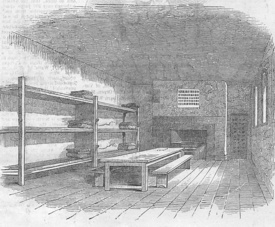 |
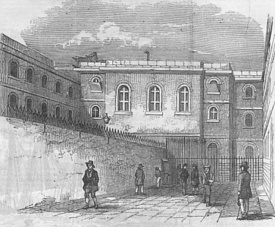 |
|
Ward for
condemned male prisoners. |
The
Chapel-yard. |
|
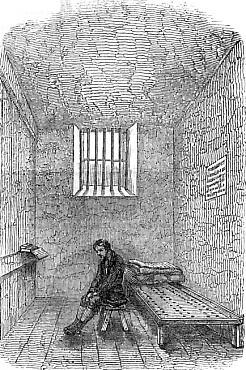 |
|
Punishment
cell. |
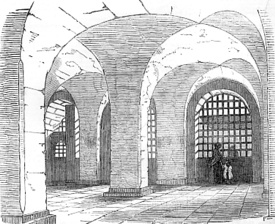 |
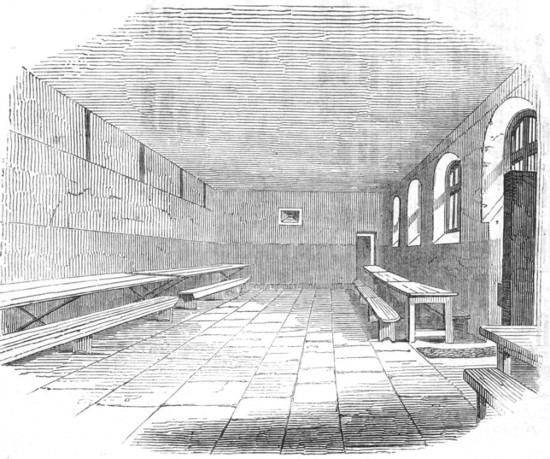 |
|
Corridor. |
A Dining Ward. |
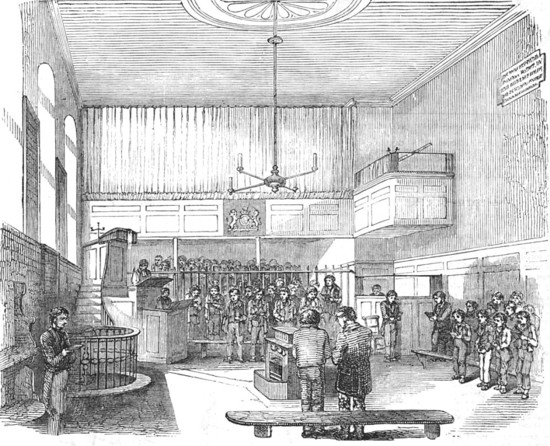 |
|
Prison Chapel |
|